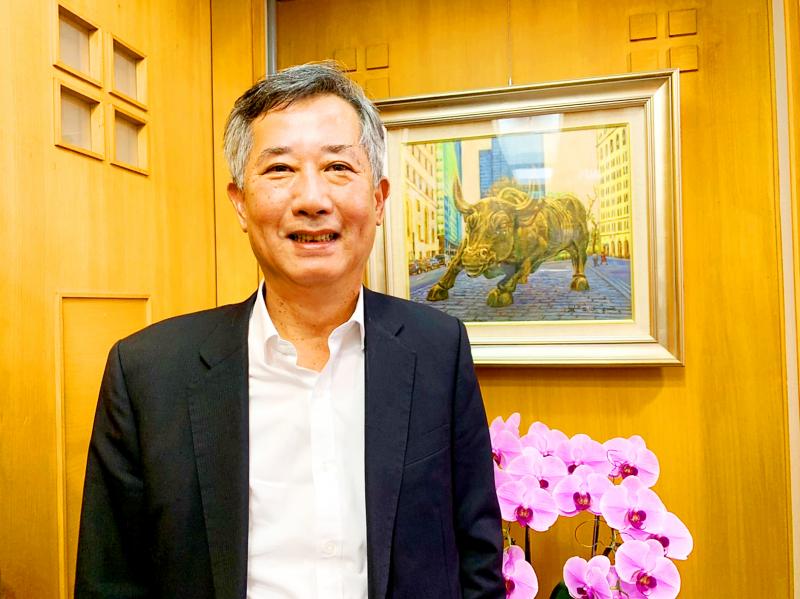United Integrated Services Co Ltd (UIS, 漢唐), which helps clients build manufacturing facilities and install clean rooms, yesterday said that it plans to set up a subsidiary in the US next year, following in the steps of its top client, Taiwan Semiconductor Manufacturing Co (TSMC, 台積電).
By managing costs well, UIS expects its US subsidiary to turn a profit in the first year of operation, company president Benny Chen (陳柏辰) told an investors’ conference in Taipei.
UIS is still in talks with TSMC about proceeding with its US fab construction project, Chen said.

Photo: Hung Yu-fang, Taipei Times
TSMC last week said that it plans to set up a wholly owned US subsidiary in Arizona with paid-in capital of US$3.5 billion after unveiling a plan to build a US$12 billion fab in the state.
UIS helps the world’s biggest contract chipmaker build manufacturing facilities, including the chipmaker’s most advanced factories, Fab 14 and Fab 18 in Tainan. Fab 14 produces 5-nanometer chips, the most advanced chips currently available, while Fab 18 is to enter volume production of 3-nanometer chips in the second half of 2022.
UIS gave an upbeat business outlook for next year, saying that revenue is expected to “remain steady” compared with this year, supported by resilient demand from overseas and robust domestic demand.
The company earlier this year forecast that revenue would hit a record high this year.
“This year, the company’s operation is boosted by explosive demand from Taiwan’s semiconductor market. Next year will be another good year; the semiconductor industry continues to be a major driver,” Chen said.
UIS has signed contracts totaling NT$43 billion (US$1.49 billion) with clients this year, Chen said, adding that NT$20 billion of that amount is to be realized by the end of this year
Only 10 percent of the NT$20 billion is coming from overseas markets, he added.
The US-China trade dispute has stalled factory construction plans in China this year, Chen said.
Some of the company’s Chinese clients might restart fab construction next year, but most of them would likely be less advanced fabs, he said.
UIS saw its net profit soar 55 percent year-on-year to NT$3.15 billion in the first three quarters of this year, from NT$2.03 billion in the same period last year. That translated into earnings per share of NT$16.52, up from NT$10.67.
Revenue skyrocketed 72 percent to NT$28.81 billion in the January-to-September period from NT$16.74 billion a year earlier.

NEW IDENTITY: Known for its software, India has expanded into hardware, with its semiconductor industry growing from US$38bn in 2023 to US$45bn to US$50bn India on Saturday inaugurated its first semiconductor assembly and test facility, a milestone in the government’s push to reduce dependence on foreign chipmakers and stake a claim in a sector dominated by China. Indian Prime Minister Narendra Modi opened US firm Micron Technology Inc’s semiconductor assembly, test and packaging unit in his home state of Gujarat, hailing the “dawn of a new era” for India’s technology ambitions. “When young Indians look back in the future, they will see this decade as the turning point in our tech future,” Modi told the event, which was broadcast on his YouTube channel. The plant would convert

‘SEISMIC SHIFT’: The researcher forecast there would be about 1.1 billion mobile shipments this year, down from 1.26 billion the prior year and erasing years of gains The global smartphone market is expected to contract 12.9 percent this year due to the unprecedented memorychip shortage, marking “a crisis like no other,” researcher International Data Corp (IDC) said. The new forecast, a dramatic revision down from earlier estimates, gives the latest accounting of the ongoing memory crunch that is affecting every corner of the electronics industry. The demand for advanced memory to power artificial intelligence (AI) tasks has drained global supply until well into next year and jeopardizes the business model of many smartphone makers. IDC forecast about 1.1 billion mobile shipments this year, down from 1.26 billion the prior

People stand in a Pokemon store in Tokyo on Thursday. One of the world highest-grossing franchises is celebrated its 30th anniversary yesterday.

Zimbabwe’s ban on raw lithium exports is forcing Chinese miners to rethink their strategy, speeding up plans to process the metal locally instead of shipping it to China’s vast rechargeable battery industry. The country is Africa’s largest lithium producer and has one of the world’s largest reserves, according to the US Geological Survey (USGS). Zimbabwe already banned the export of lithium ore in 2022 and last year announced it would halt exports of lithium concentrates from January next year. However, on Wednesday it imposed the ban with immediate effect, leaving unclear what the lithium mining sector would do in the